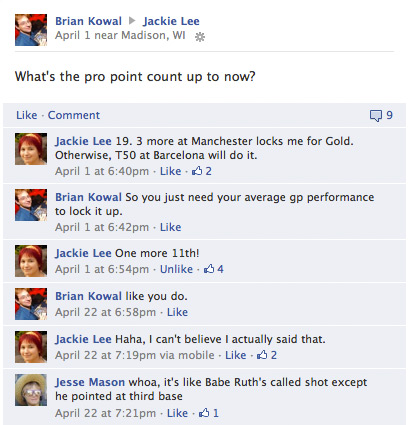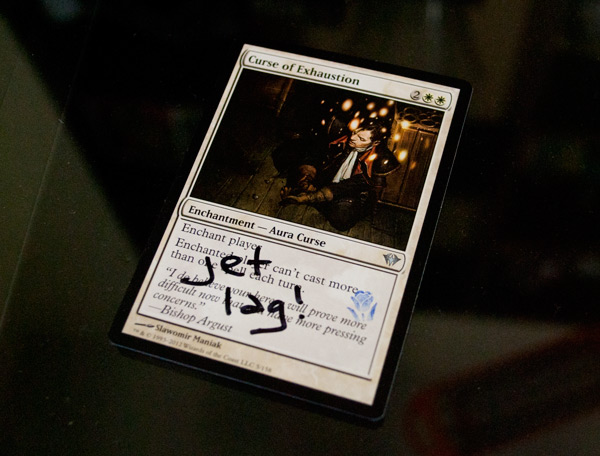A couple weeks ago, I stated that touring the GP circuit cannot be financially self-sustaining, even if you do relatively well. However, one good reason to try is the excuse to travel. Regardless of how much money you do or don’t make, you can count on new sights and a great experience.
My latest escapades come from Manchester, England. After two long days of Magic, I attempted to break through the crowd clustered around the final standings.
"Guess what place you finished," Martin Juza urged with a signature smirk.
"Really?"
Sure enough, I’d finished 11th for the third GP in a row. As some onlookers observed, my elevens were apparently not yet up.
Afterwards, Brian Kowal made this interesting discovery on Facebook:

That’s right; three weeks prior, I’d jokingly called another 11th place finish.
And then some stuff that I can only assume is about baseball. That was Babe Ruth’s claim to fame, right? He was so good at baseball, he got a candy bar named after him?
Anyway, I’m glad I placed exactly as well as I needed to lock Gold. It’s a huge relief not having to worry about how I do in Barcelona. I mean, sure, I did vow revenge on the Pro Tour after being edged out of prize in Honolulu. But I think that revenge is probably more satisfying when the victim (in this case, a non-sentient series of card tournaments) doesn’t know when it’s coming. But then again, I get most of my ideas about revenge from a fictitious alien race I saw on Star Trek as a child. You know the one.
On that note, let me tell you about some of the lessons this trip had to offer.
Insure Your Cards
We regularly carry thousands of dollars in cards around with us. Thousands of dollars in cards that we spent hundreds of hours assembling. It’s fine to be an eccentric collector, but you can’t control variance. That’s something we, as Magic players, should understand all too well.
Investing in homeowner’s or renter’s insurance can help you "play around" the unthinkable. When you’re on the road, you subject yourself to many opportunities for variance. If you travel with a computer, or other expensive valuables, then that’s all the reason you should need to take this precaution. Last month, Melissa DeTora and James Searles had their computers stolen from our hotel room in Mexico. Thankfully, it was covered by the hotel’s insurance, but that won’t be the case for every situation.
Travel is, by definition, a voyage into the unknown. It’s a disruption to routine. The number one reason for patients to forget to take important medication is disruption to routine. That’s no coincidence. So if you know you’re putting yourself into that situation, take some precaution. At the very least, assess your valuables and the cost of insurance to see if it makes sense.
It may sound trivial, but if this comes up even one time for you, it could prove to be worth decades of Premium subscription.
Theft can happen at any time. For me, this was a very expensive lesson.
Cursed by Jet Lag
During my byes, I played a couple practice games with my Sealed deck. This is generally a good practice, both to familiarize yourself with the deck and to get in the proper mindset for playing Magic.
At one point, I had two 1/2 Spirits opposite a 2/2 Tower Geist. My opponent couldn’t attack into the 1/2s or he’d just trade his 2/2 for an inferior 1/2. So guess what I did.
I attacked them both into his 2/2. He blocked.
What?!
If he wasn’t willing to trade one-for-one, why would I throw away my board stability for one point of damage?
The answer is that I wouldn’t.
Not normally, anyway.
I arrived in Manchester on Friday morning after sleeping very little on a red-eye. Even though I got a full night’s rest for Saturday morning, this may not have counteracted any sleep debt from the night before. Most of all, it certainly didn’t overcome the fact that my circadian rhythm was still set to a time zone five hours different.
In the eighth round of Day 1, I caught myself making a similar, unusual misplay. It wasn’t enough to cost me the match, but it did serve as a warning sign.
In round 9, it definitely cost me the match. I’m not saying I would have won if I’d been playing my best, but it absolutely would have been close. For example, I threw a Blazing Torch to kill a Highborn Ghoul before damage, even though it meant my 1/4 would no longer kill the 1/1 Unruly Mob it was blocking. The Mob then grew out of control, leaving me with no options.
In another situation, I chump blocked with an Elgaud Inquisitor for just about no reason. I reasoned, "It will never be big enough to trade with that attacker, so I might as well get a couple points of life and a Spirit," while completely forgetting that I could draw another creature to help kill it.
Afterwards, James Searles told me that he’d been watching, and he had no idea what was going on. All of the plays I made demonstrated an uncharacteristic lack of foresight. I’m very familiar with the effects of hunger and sleep deprivation on play, but jet lag is a relatively new danger. When traveling more than a few hours’ time difference, it’s recommended you arrive more than one day in advance. I know very well why now!
While sorting through my cards at the end of the day, this one stuck out. I’m pleased to say that I’ve finally found a use for Curse of Exhaustion.

A cautionary keepsake.
Missing the Point of Missed Triggers
In preparation for GP Manchester, I read up on the new IPG and asked judges to help clarify areas of confusion for me. One of the articles I’d read was Jason Flatford guide to these rule changes. He summarizes "everything you need to know as a player" with this: "Don’t miss your triggers!"
While this is surely most of what you need to know, I would hardly call it "everything" for a player who regularly plays at a competitive REL. Part of being highly competitive is a strong understanding of the rules. Even though missed triggers falls under a policy infraction, it might as well be a fundamental part of the rules if you’re playing competitive Magic.
You might consider abuse of these guidelines "scummy," and that’s perfectly fine. Personally, I draw a hard line at the game’s official rules and try not to make judgments beyond the scope of obvious unsportsmanlike conduct. I know those are the rules to which I’m held, so I hold my opponents to the same standard—and no other.
First of all, you are never responsible for pointing out an opponent’s missed trigger. No more telling your opponent to flip his Mayor of Avabruck! No more telling your opponent to return Chandra’s Phoenix to her hand! No more helping your opponent win. This is the most important change.
It’s also useful to know that there are two types of trigger: lapsing and non-lapsing. Lapsing triggers are defined by a list of "beneficial" abilities. If your opponent is destroying one of your permanents, hurting you, or gaining life, it’s probably a lapsing trigger.
If your opponent forgets a lapsing trigger, it’s up to you what happens. If you want to make it happen, you can. However, you must point it out in the same turn segment: before combat, during combat, and after combat. You may call a judge to give a warning for the missed trigger, but only if you choose to allow it to resolve. Insult to injury is not allowed. If you deny the trigger’s effect, you also deny the warning.
What if the trigger is not lapsing? Then things get uncomfortable. Your opponent has a full turn cycle to catch it before it’s gone forever. Notable non-lapsing triggers include Werewolf transformations. That means that if your opponent fails to transform his Mayor of Avabruck during your upkeep, but he catches it during his second main phase—or even during combat—a judge will immediately put the transformation on the bottom of the stack. He will get a Wolf token that turn.
So what if the transformation happens during combat after blockers? It’s out of your hands. A judge will decide whether or not your opponent intentionally waited for this critical moment or if he honestly just remembered.
The best solution? Don’t put yourself in that situation unless it’s worth the risk. You need to use your own judgment about whether or not an opponent will catch the trigger, but if you can play as though it’s transformed for an entire turn cycle you might as well. Oh, and definitely don’t try to call a judge for a warning (unless you’re okay with the trigger resolving).
If you don’t like the way non-lapsing triggers work, it’s worth a reminder that this is the way they already worked. The new IPG has simply given us a category of lapsing triggers to avoid this awkward situation sometimes.
Finally, the previous IPG was rescinded because it caused Transcendence to play fundamentally differently at a PTQ versus FNM. This new IPG is an improvement in that regard, but some cards still actually work differently.
As an example which came up in a judge call, one player cast Claustrophobia on her opponent’s creature and passed the turn. During her opponent’s turn, she realized the creature wasn’t tapped. In fact, it had never tapped at all.
Tapping an opponent’s permanent: lapsing trigger.
So now, if you don’t specifically tell your opponent to tap his creature, he might not do it. And that’s not his responsibility.
If you don’t state that Geist of Saint Traft puts an Angel into play? It just doesn’t happen.
I think the Claustrophobia example is particularly insidious, because tapping the creature feels like such an intrinsic part of the spell. For Geist of Saint Traft, few players put an actual Angel token into play. It’s just going to be removed after combat! But you’d better make it verbally clear from now on, or you might miss out on damage. If that happens, don’t blame the judge for "screwing you over." Those are just the rules now.
If I were to summarize missed triggers in one sentence, it’d be this:
"You don’t need to point out your opponent’s missed triggers, but be very careful not to miss your own and be wary if your opponent misses a lapsing trigger."
Remember, this is just for REL Competitive. At FNM, you should be helping your opponent learn to play; pointing out missed triggers is one part of how you can do that.
Final Words
I’ve certainly enjoyed writing for StarCityGames.com, and I want to thank everyone who has supported me in this endeavor. However, another opportunity has arisen, and I will no longer be writing my articles for SCG. Even so, I hope you’ll continue to follow me.
Until next time, I’ll leave you with the closing comment of that Facebook conversation.

Revenge is a dish best served cold.
—Klingon proverb
Love and battle,
Jackie Lee—
@JackieL33 on Twitter
